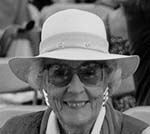
"Gymnastic," wrote Plato in The Republic, "is as much a part of the soul's education as music is, and the noblest natures, at once brave and wise, require a harmonious blend of the two."
At a time when, in the manner of Plato, a self-reflective examination of what the well-educated student should be and know engages Oberlin's attention (see "New Rules for the Accreditation Playbook"), two alumni have demonstrated that they believe, in the manner of Plato, that athletics comprise an important element in the educational ethos.

W. Shelby Oliver '35 and his wife, Evelyn Gordinier Oliver '34, have bestowed upon the College a charitable gift annuity of $1 million to endow a named directorship in the Department of Athletics. "Dr. and Mrs. Oliver have always been marvelous supporters of Oberlin's athletic department," says Donald Hunsinger, director of athletics and physical education. "Their tremendous generosity [Oliver was a major force behind construction of the Heisman Room] and emotional support for this department has been magnificent." Hunsinger will assume the title of Delta Lodge/Oliver Director of Athletics.
"Delta Lodge is part of the sweet and good history of Oberlin," says Vice President of Development, Alumni Affairs and Communications Young Dawkins. A relic of that history commands the immediate attention of visitors to Dawkins's office: a sign that once identified the house on North Professor Street where, from the 1920s to the '40s, student athletes who took their studies seriously lived. As tangible as any sign, though, are the memories Shelby Oliver holds of his own years spent there.

Oliver lettered in football and track, played on the College's basketball team, and, inspired by Professor of Chemistry Alfred Lothrop--whom Oliver remembers as a "wonderful teacher . . . very friendly . . . liked Delta kids"--changed his mind about becoming a physical-education teacher and switched his major to pre-med. He sang in the Glee Club and, thanks to the diligent promotion of some Delta Lodge fellows, his senior class elected him as its president.
Plain-spoken and self-effacing ("I wasn't an athlete--just a poor kid who went to Oberlin."), Oliver makes it clear that the bonds he forged with Delta Lodge friends such as John Brown '33; Al Woodward and Johnny Shaw, both '35; and Scotty Cooper '36, mean more to him than the fact that his name will be forever conjoined to Delta Lodge by virtue of the Oliver gift.
Bonds of friendship seem always to have had significance to Oliver. In his application to Oberlin, he wrote that the reason he wanted to attend college was that he wished to "fit myself better for life mentally, physically and socially and to enlight upon my heart the bonds of friendship."

When asked if his time at Oberlin accomplished this, he replied, "I suppose it did. I met my wife there, you know. We've been married 60 years." A pianist, Evelyn Gordinier Oliver gave up a musical career, says Oliver, to devote herself to their family. The Olivers raised nine children; six of their own, and three nephews.
Oliver earned an M.D. degree at Western Reserve University (now Case Western Reserve University) in 1939. Following a three-year stint with the U.S. Army Medical Corps during World War II and a surgical residency at University Hospitals in Cleveland, he set up practice at California's Alameda Hospital, where he also served on the board of trustees, and where his son, David '62, is also a surgeon. "I don't know whether I taught him or he taught me," says Oliver. Retired for 20 years, the Olivers live in Borrego Springs, a place he calls "the last paradise in California."
Calling the newly endowed athletic directorship "a wonderful gift for Oberlin," Young Dawkins says, "Dr. Oliver believes deeply in the idea of the scholar-athlete and wishes to help maintain athletics' place in the overall educational framework of the College."
Plato would have been pleased.
--Marci Janas '91
Return to Around Tappan Square
Return to the OAM Summer 1996 Table of Contents